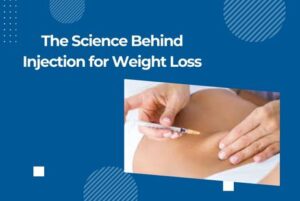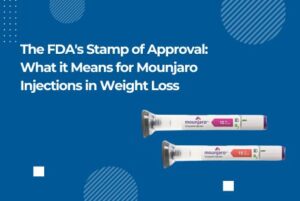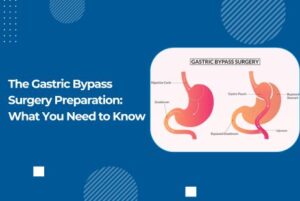Mini Gastric Bypass Surgery is a safe and minimally invasive surgery that reduces the size of your stomach. But your journey to achieve weight loss doesn’t end with the surgery. After the surgery, it is crucial to follow a strict diet in order to get better and long-term results and boost healing.
However, implementing new drinking and eating behavior while providing your body with proper nutrition can be a challenging process. Which is why our expert Dr. Girish Juneja helps you plan a diet to follow after a mini-gastric bypass. Also, please note that as you advance in each stage, you can consume the food that you had in previous stages.
Diet to follow after a mini gastric bypass
Stage 1: Day of Surgery
Primary Diet:- Water/Liquids
Stage 1 is typically on the day following the surgery. At this stage, drink 1-ounce of water every hour. Sip slowly from your cup, and please don’t force it if you feel nauseated. Occasionally, you may experience dry mouth, for which you will be provided with swaps to moisten your mouth.
Stage 2: Few days post-surgery
Primary Diet:- Clear liquids
Stage 2 is the day after the surgery day. On this day, make sure to drink plenty of liquids. It is necessary to avoid any postoperative complications such as bowel obstruction, gastric leakage, diarrhea, dehydration, and constipation.
Diet instructions for day 2 are as follows:
- Aim to consume 3 ounces of sugar-free gelatin three times per day.
- The clear liquids that you can have are soup broth, vegetable juice, skimmed milk, decaffeinated tea, etc.
- If you are having trouble staying hydrated, ask your doctor about which electrolyte drinks you can take.
- Avoid caffeine, carbonated beverages, and any drink with sugar.
Stage 3: First and Second-week post-op
Primary Diet:- High-Protein full liquids (Sugar-free and low-fat)
Stage 3 is usually the first two weeks post-op. Stage 3 is the diet you will be discharged home on.
Diet instructions for stage 3 are as follows:
- Aim to consume 50-70 grams of protein per day.
- At this stage, you can consume shakes made with protein powder, fruit juices with no pulp, oatmeal, thinned cereal, nonfat plain Greek yogurt, etc.
- Choose sugar-free and/or “no-sugar-added” products.
- Make sure that the gap between two meals does not exceed four hours.
- Sip and eat slowly while keeping in mind that your meals should last about 45 minutes to an hour.
Stage 4: Third Week.
Primary Diet:- Soft and Moist Protein
Stage 4 is usually the third week after the surgery. At this stage, you can start eating pureed food that has the homogeneity of a smooth paste or a thick liquid.
Diet Instructions for stage 4 are as follows:
- Aim to Increase your protein intake as it is necessary for faster healing and recovery.
- In your diet, include soft scrambled eggs, cooked cereals and vegetables, mashed bananas and other soft fruits, pureed white fish, cottage cheese, and strained cream soups.
- Blend your sold fluids with liquids such as water, broth skim milk, or sugar-free juice.
- Use supplements such as multivitamins with minerals, Calcium Citrate plus Vitamin D, B12, and Vitamin D3 to meet your nutrition goals and prevent deficiencies.
Stage 5: Fourth and fifth week.
Primary Diet:- Low-fat, Low-sugar, High Protein
Now that you are one-month post-surgery, you can start eating soft foods as your body has gotten used to the procedure.
Diet Instructions for stage 5 are as follows:
- Chew food thoroughly and do not drink fluids with meals.
- Add one new food at a time and keep meals small.
- Make sure you cut or chop all foods until they are a ground consistency.
- You can include well-cooked vegetables, chicken, fish, white potatoes, and fruits in your diet.
- Avoid hard-to-digest food such as fibrous vegetables, nuts, and high-carb dietary foods.
Stage 6: Sixth week and beyond.
After stage 5, you can eat solid food safely. Except for occasional soda and sugary drinks, you can ease back into most foods. However, choose your diet wisely and eat healthily. Focus on high-protein foods and makes sure to take a multivitamin supplement every day.
Dr. Girish Juneja is one of the most renowned doctors for weight loss surgeries in Dubai. While mentioning that the post-operation phase can be difficult, he urges patients to remember that they are not alone in this process. Further, he advises the patients to be involved in support groups and schedule regular follow-up visits with the medical team. For Dr. Juneja’s valuable services and consultations, book an appointment today!
Tags:

Dr. Girish Juneja









